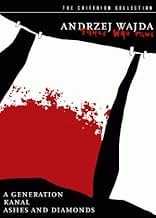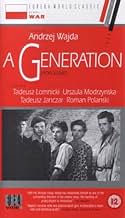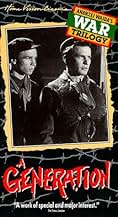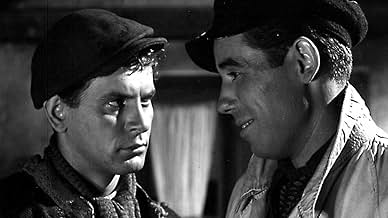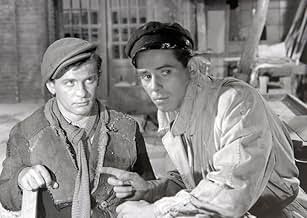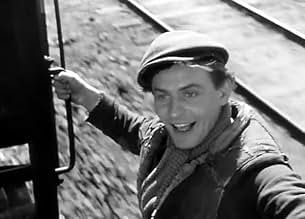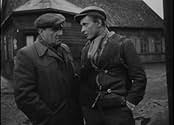Ajouter une intrigue dans votre langueStory of youth during the German occupation of Poland in World War II who come to adulthood through love and adversity.Story of youth during the German occupation of Poland in World War II who come to adulthood through love and adversity.Story of youth during the German occupation of Poland in World War II who come to adulthood through love and adversity.
- Réalisation
- Scénario
- Casting principal
Avis à la une
As for what I thought of Andrzej Wajda's feature debut. I earlier saw Wajda's "Popiół i diament" ("Ashes and Diamonds" in English). From what I understand about the themes that Wajda depicted in that one, it sounded like what we might call the perfect Polish movie. "A Generation" is also really good, although I did find "Ashes and Diamonds" to be a little better. In an interview, Wajda noted that the title refers to his generation: the leaders of Poland's pre-war film industry had fled the country, and so his generation was essentially starting it from scratch.
All in all, a very good movie. Watch for a young Roman Polanski as one of Stach's compatriots.
The movie stars Urszula Modrzynska as Dorota--a resistance leader who recruits students to join the resistance during the German occupation of Poland. Stach Mazur (Tadeusz Lomnicki) is a young man who answers the call to resist the occupying army.
Even at this stage of his career, Wadja had talent, and many of the scenes in the movie are memorable. However, some of the plot elements were clearly added to please the censors, because Poland was under Soviet rule by 1955. For example, the movie puts forth Communism as the only form of Polish resistance. Of course, Communists were in the resistance, but so were non-Communists. Ringing speeches about how Poland will be happy and free under Communism are painful to watch, given what we know now. (And, of course, given what Wadja knew in 1955.)
Still, Wadja got this brave and important movie past the censors, and presented us with a film that is definitely worth seeing.
We saw this movie at the marvelous Dryden Theatre at George Eastman House in Rochester. It was shown as part of a Wadja retrospective. It's not a great film, but it's a very good film. It's worth seeing on it's own merits, and definitely worth seeing if you have watched--or plan to watch--Ashes & Diamonds and Kanal. (The other two movies in the World War II trilogy.)
What is so striking to me about this film is the irony of history: I believe that not only we (living in the 21st century) are able to understand this now, but that viewers of this film in 1955 Poland would have recognized as well. By 1955 Poland was stuck behind the Iron Curtain, held hostage by communist rule. Not unlike the Czechs (and their great communist satires), all art and media was mediated by the communist government. To see these young Poles attempt to improve their country by overthrowing the Nazi party with communism is ironic and ultimately tragic.
Although this film may appear to some as communist propaganda, I see this film as a tongue-in-cheek allegory about the meaninglessness of war, and the complication of those attempting to end the war with another flawed ideology. Not a great film, but certainly interesting, especially when considering the historical context in which it was made.
Le saviez-vous
- AnecdotesFirst feature film directed by Andrzej Wajda.
- Citations
[first lines]
Stach Mazur: I was born here in the slums, on the outskirts of Warsaw. I grew up in poverty. Here I made my first friends and had my first lessons. I often had it rough as a kid, because I couldn't tell my friends from my enemies. I was too trusting and relied on my swift legs and strong fists. My Ma kept me on a short leash and tried to push me off to work. But I took it as typical woman's nagging, preferring to play knives with my buddies instead.
- ConnexionsFeatured in Zbyszek (1969)
- Bandes originalesStändchen
Composed by Franz Schubert
Meilleurs choix
- How long is A Generation?Alimenté par Alexa
Détails
Box-office
- Montant brut mondial
- 24 114 $US
- Durée
- 1h 27min(87 min)
- Couleur
- Mixage
- Rapport de forme
- 1.37 : 1


